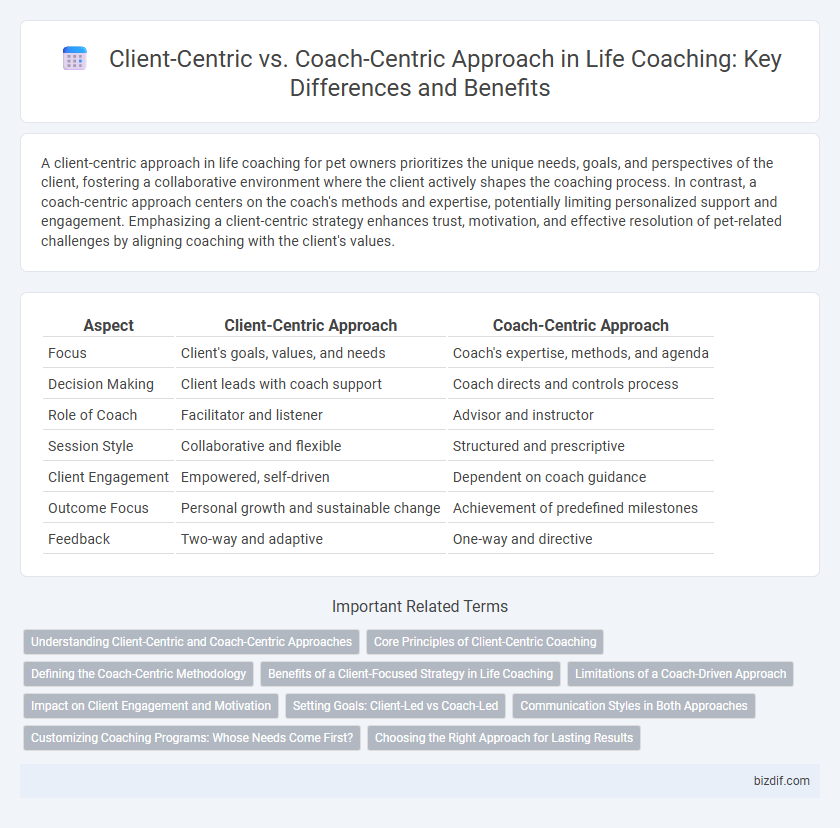A client-centric approach in life coaching for pet owners prioritizes the unique needs, goals, and perspectives of the client, fostering a collaborative environment where the client actively shapes the coaching process. In contrast, a coach-centric approach centers on the coach's methods and expertise, potentially limiting personalized support and engagement. Emphasizing a client-centric strategy enhances trust, motivation, and effective resolution of pet-related challenges by aligning coaching with the client's values.
Table of Comparison
| Aspect | Client-Centric Approach | Coach-Centric Approach |
|---|---|---|
| Focus | Client's goals, values, and needs | Coach's expertise, methods, and agenda |
| Decision Making | Client leads with coach support | Coach directs and controls process |
| Role of Coach | Facilitator and listener | Advisor and instructor |
| Session Style | Collaborative and flexible | Structured and prescriptive |
| Client Engagement | Empowered, self-driven | Dependent on coach guidance |
| Outcome Focus | Personal growth and sustainable change | Achievement of predefined milestones |
| Feedback | Two-way and adaptive | One-way and directive |
Understanding Client-Centric and Coach-Centric Approaches
The client-centric approach in life coaching prioritizes the client's goals, emotions, and unique experiences, fostering empowerment and personalized growth. In contrast, the coach-centric approach emphasizes the coach's expertise, techniques, and agenda, potentially limiting the client's autonomy and engagement. Understanding these approaches helps tailor coaching strategies to maximize effectiveness and client satisfaction.
Core Principles of Client-Centric Coaching
Client-centric coaching prioritizes the individual's goals, values, and unique experiences, fostering empowerment and self-discovery through active listening and personalized guidance. Core principles include empathy, collaboration, and unconditional positive regard, which create a supportive environment for sustainable growth and transformation. This approach contrasts with coach-centric methods that emphasize directive advice or predetermined strategies, often limiting client autonomy and engagement.
Defining the Coach-Centric Methodology
The coach-centric methodology in life coaching emphasizes the coach's expertise, techniques, and structured frameworks to guide clients through personal development. This approach relies on the coach's insights to diagnose challenges, set goals, and prescribe actionable strategies tailored to proven models. Although effective in delivering targeted interventions, it contrasts with client-centric methods by prioritizing the coach's role as the primary driver of the coaching process rather than the client's own experiences and autonomy.
Benefits of a Client-Focused Strategy in Life Coaching
A client-centric approach in life coaching prioritizes the unique needs, goals, and values of the individual, fostering deeper engagement and personalized growth. This strategy enhances motivation by empowering clients to take ownership of their progress, leading to sustainable behavior change and improved self-awareness. Emphasizing collaboration over directive guidance creates a supportive environment that accelerates goal attainment and overall life satisfaction.
Limitations of a Coach-Driven Approach
Coach-centric approaches often limit the effectiveness of life coaching by prioritizing the coach's methods and agendas over the client's unique needs and goals. This approach can lead to misaligned coaching outcomes, reduced client engagement, and hindered personal growth, as it fails to empower clients to take active ownership of their development. Emphasizing a client-centric strategy ensures tailored guidance, fostering deeper self-awareness and sustainable change.
Impact on Client Engagement and Motivation
A client-centric approach in life coaching emphasizes personalized strategies that align with the client's values and goals, significantly enhancing engagement and intrinsic motivation. In contrast, a coach-centric approach often prioritizes the coach's methods and expertise, which can lead to reduced client involvement and diminished motivation over time. Empirical studies indicate that client engagement increases by up to 40% when coaching is tailored to individual client needs rather than standardized coach-driven techniques.
Setting Goals: Client-Led vs Coach-Led
In life coaching, a client-centric approach prioritizes the individual's values and aspirations, allowing clients to set personal, meaningful goals that foster intrinsic motivation and empowerment. Conversely, a coach-centric approach often involves the coach defining goals based on their expertise or framework, which may limit client ownership and reduce engagement. Research indicates that client-led goal setting enhances commitment and long-term success by aligning outcomes with the client's unique context and priorities.
Communication Styles in Both Approaches
Client-centric approaches emphasize active listening, empathy, and tailored communication to align with the client's unique needs and goals, fostering trust and openness. Coach-centric approaches rely on directive communication, where the coach primarily guides the conversation and sets the agenda based on their expertise. Effective life coaching benefits from adapting communication styles to prioritize client engagement, ensuring meaningful dialogue and personal development.
Customizing Coaching Programs: Whose Needs Come First?
Client-centric coaching prioritizes the unique goals, challenges, and preferences of the individual, customizing programs to foster personal growth and sustainable success. Coach-centric approaches rely on standardized methods shaped by the coach's expertise and style, potentially overlooking the client's specific needs and circumstances. Effective life coaching emphasizes client-driven customization to enhance engagement, accountability, and measurable outcomes.
Choosing the Right Approach for Lasting Results
A client-centric approach in life coaching prioritizes the individual's unique goals, values, and strengths, fostering empowerment and sustainable growth. In contrast, a coach-centric approach centers on the coach's techniques and expertise, which may limit personalized outcomes and client engagement. Selecting a client-centric method enhances trust, motivation, and long-term transformation by aligning coaching strategies with the client's personal context and needs.
Client-centric approach vs Coach-centric approach Infographic

 bizdif.com
bizdif.com